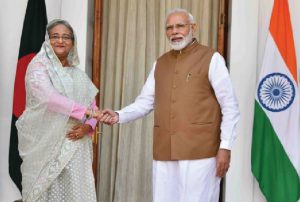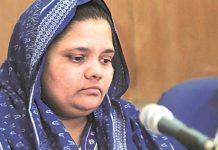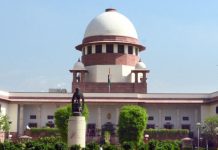 What transpired between Prime Minister Narendra Modi and his Bangladesh counterpart Sheikh Hasina during her recent visit to India evoked more than usual interest as the process of preparing the National Register of Citizens (NRC) in Assam had just ended with 1.9 million people not finding their names included in the final NRC. It was a big challenge for India to ensure that the issue of illegal Bangladeshis did not damage the friendly relations between the two countries.
What transpired between Prime Minister Narendra Modi and his Bangladesh counterpart Sheikh Hasina during her recent visit to India evoked more than usual interest as the process of preparing the National Register of Citizens (NRC) in Assam had just ended with 1.9 million people not finding their names included in the final NRC. It was a big challenge for India to ensure that the issue of illegal Bangladeshis did not damage the friendly relations between the two countries.
Sheikh Hasina told media persons at a reception at the Bangladesh High Commission that she saw “no problem” with the NRC exercise in Assam. Her friendly remark was, “I had a talk with PM Modi. Everything is okay.”
Modi had reportedly assured her that there was “nothing to be worried” about the NRC as India would not do anything that could harm its relations with Bangladesh.
Contrary to what she said in New Delhi, her remarks after the two leaders met in New York on the sidelines of the UN General Assembly session were that the NRC in Assam had become a matter of “great concern” for Bangladesh. Sheikh Hasina’s visit to New Delhi may have lessened Bangladesh’s anxiety as, according to Bangladesh Foreign Secretary Shahidul Haque, his country was assured by India that the implementation of the NRC in Assam was an internal matter. Yet he indicated that Dhaka would keep a close watch on all kinds of NRC-related developments.
However, Sheikh Hasina made a significant point soon after she landed in New Delhi. Addressing a meeting of the World Economic Forum on October 4, she suggested, “We should strive to secure peace, stability and harmony for every individual across our societies. We must move beyond the majority-minority mindset. Pluralism has been the strength of South Asian countries. We should be able to celebrate South Asia’s regional, ethnic and linguistic diversity.”
By highlighting the “majority-minority mindset” factor she, perhaps, wanted to point out that this had been used recklessly to ensure political domination, not bothering about its impact on peace and economic growth in the region.
Bangladesh expressed its concern over the Assam NRC process for the first time when its Foreign Minister AK Abdul Momen told a TV channel on July 13, 2018: “While we should not be worried (about the NRC issue), there is some anxiety after reading news reports. We are already in much difficulty with 11 lakh (Rohingya) refugees. We can’t take anymore.
Bangladesh is the most densely populated country on the planet.”
Denying that the people identified under the NRC process were Bangladeshi immigrants, he said, “The people that have been there for 75 years, they are their (India’s) citizens, not ours.”
This shows that the people in Assam whose names have not been included in the NRC may remain where they are. They, however, remain anxiety-ridden despite the fact that they have the option of approaching Foreigners Tribunals set up for the purpose. If anyone loses one’s case in a tribunal, the person concerned can file an appeal in the Guwahati High Court and the Supreme Court. Those who ultimately fail to prove their claim as Indian nationals will be lodged in detention camps so that they can be deported to their “home country”.
This raises a very tricky question. Where will these people finally go when Bangladesh continues to assert that there are no undocumented Bangladeshis in India? As it appears, the country is heading for a major human crisis. It may become a big roadblock in the economic growth process which calls for urgent attention of the government.
Reports indicate that the government is ready to handle the situation by coming up with the Citizenship (Amendment) Bill, 2016, which was earlier adopted by the Lok Sabha but could not get through the Rajya Sabha. The Bill seeks to amend the Citizenship Act, 1955, to provide citizenship to illegal immigrants from Afghanistan, Bangladesh and Pakistan if they are Hindus, Sikhs, Buddhists, Jains, Parsis or Christians by describing them as persecuted communities. However, there is no provision for Muslims, who have also been subjected to persecution in these countries because of various factors, including the language they speak. There is no mention of even Ahmediyas too in the Bill, which, after an amendment, will reduce the requirement of 11 years of continuous stay in the country to six years for entitlement to get Indian citizenship.
Union Home Minister Amit Shah has tried to clarify this point on different occasions by saying that people belonging to these denominations need not worry about their citizenship status as a result of the NRC wherever and whenever it is set in motion. When he says this he only reiterates the promise made by his party, the BJP, in its election manifesto in 2014 that Hindus persecuted in the countries in India’s neighbourhood would be granted citizenship.
But can we call it justice if the government bestows its favour on all excepting Muslims? If we have a close look at the history of persecution of humans by humans, we will realise that religion has not been the only factor behind such developments. Language and culture have also been used for the persecution of people in different parts of the world.
Can anyone deny the fact that language and culture had no role to play in the situation that led to the birth of Bangladesh in 1971?
Thousands of those who did not speak Bengali were tortured and done to death in the then East Pakistan at the hands of Bengali-speaking people. Persecution of Urdu-speaking people called “Biharis” there is a too well-known reality. People in Bangladesh even now hate Urdu, considering it as the language of their subjugation in the past.
The harrowing experience of the people in Assam should convince us to forget about launching another NRC process in the country. The search for undocumented Bangladeshis in this manner will amount to an invitation to chaos and destabilisation which will ultimately shake the country by its very foundations.
Can we ignore the strong opposition being expressed by the Asom Gan Parishad, the All-Assam Students Union, the Krishak Mukti Sangram Samiti and others to the idea of favouring any community by describing its members as persecuted people? These Assam-based organisations have stated that the Citizenship Amendment Bill will go against the cultural and linguistic identity of the ethnic Assamese. The Assam Gan Parishad has threatened to even leave the political alliance formed with the BJP if its viewpoint is not given the attention it deserves.
Many Opposition parties, including the Congress and the All-India United Democratic Front, have also opposed the idea of granting citizenship to anyone on the basis of a person’s religious identity. The argument goes that once the Bill becomes an Act, it will make the NRC meaningless. It will turn out as a remedy worse than the disease.
Why then is the talk of launching an NRC process in West Bengal, UP and Haryana, which went to the polls recently? Is the idea aimed at creating communal polarisation for political gains irrespective of the damage it will cause to the country?
letters@tehelka.com













